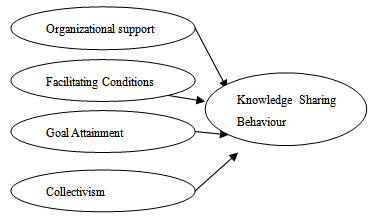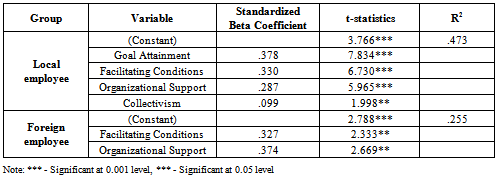-
Paper Information
- Next Paper
- Previous Paper
- Paper Submission
-
Journal Information
- About This Journal
- Editorial Board
- Current Issue
- Archive
- Author Guidelines
- Contact Us
American Journal of Economics
p-ISSN: 2166-4951 e-ISSN: 2166-496X
2013; 3(C): 12-15
doi:10.5923/c.economics.201301.03
Cultural Impact on Knowledge Sharing Behaviour of Foreign and Local Employees in Private University Malaysia
Yuen Yee Yen, Siti Nurul Huda Mohd, Pook Sow Yee, Lim Kah Boon
Faculty of Business, Multimedia University, Jalan Ayer Keroh Lama, Melaka, 75450, Malaysia
Correspondence to: Yuen Yee Yen, Faculty of Business, Multimedia University, Jalan Ayer Keroh Lama, Melaka, 75450, Malaysia.
| Email: |  |
Copyright © 2012 Scientific & Academic Publishing. All Rights Reserved.
This study is conducted to identify the antecedents of knowledge sharing in private universities in Malaysia. This study will provide insights into what local and foreign employees in private universities in Malaysia consider important in their sharing knowledge, which is believed to have important implications for research and practice. The results of this study discover that facilitating conditions and organizational support are important factors that affect knowledge sharing behaviours in private universities in Malaysia. Goal attainment and collectivism positively affect knowledge sharing behaviour of local employees but it does not have significant impact on knowledge sharing behaviour of foreign employees.
Keywords: Knowledge Sharing, University, Private, Employees
Cite this paper: Yuen Yee Yen, Siti Nurul Huda Mohd, Pook Sow Yee, Lim Kah Boon, Cultural Impact on Knowledge Sharing Behaviour of Foreign and Local Employees in Private University Malaysia, American Journal of Economics, Vol. 3 No. C, 2013, pp. 12-15. doi: 10.5923/c.economics.201301.03.
Article Outline
1. Introduction
- Knowledge sharing is essential for higher learning institutions to create core competencies and maintain competitiveness in the era of globalisation. However, Malaysia currently lacks of adequate research activities and educational infrastructure to stimulate foreign and local staff efforts towards transforming Malaysia into a knowledge economy ([12]). Since knowledge sharing and transfer in higher learning institution are crucial for the nation to achieve the vision of becoming a developed, high-income and knowledgeable country by the year 2020, it is therefore essential to establish effective knowledge sharing practices in higher learning sector. Difference in the knowledge sharing behaviour of foreign and local employees in private universities is often overlooked by many researchers worldwide. Most of the previous studies tended to limit themselves in studying knowledge sharing behaviours of local employees ([7],[19]). Reference[7] merely focused on examining key factors that hindered the knowledge sharing behaviours among employees in South Africa. Reference[19] concluded that Chinese respondents were more willing to share their knowledge with others compared with their counterparts in United States but the study did not provide detailed analysis on the key factor that contributes towards the difference in attitudes. This study is therefore conducted to identify the antecedents of knowledge sharing in private universities in Malaysia. This study will provide insights into what local and foreign employees in private universities in Malaysia consider important in their sharing knowledge, which is believed to have important implications for research and practice. With intensified globalization and rapid mobilization of human capital, this study will provide recommendations to management and educational practitioners to promote and facilitate knowledge sharing among foreign and local employees in private universities in Malaysia. Based on what the employees consider important, practitioners could design the knowledge implementation system in their universities to meet the specific requirements of foreign and local employees. The findings of this study will also enrich the current literature, which is seemingly lack of established framework for studying employees’ knowledge sharing behaviours in private universities in Malaysia. The carefully tested research instrument and framework of this study could also serve as a frame of reference for other researchers when conducting future research in similar area. The objective of this study is to propose a research framework that could be used to assess the knowledge sharing behaviours between foreign and local employees in private universities in Malaysia. Literature review, research methodology, result, discussion and recommendation will be presented in the following sections of this paper.
2. Literature Review
2.1. Knowledge Sharing Behaviour
- Knowledge sharing behaviour measures an employee’s action of acquiring and exchanging knowledge, intellectual assets, and intangible capital with other employees in an organization ([13]). Knowledge sharing among foreign and local employees in organizations such as private university is critical to the success of knowledge management inside the organizations ([5]). Productivity and efficiency of the organization could be enhanced when the knowledge and expertise of a technology-savvy foreign employee is successfully transferred to a local employee ([22]). Knowledge sharing behaviour is influenced by the following factors:
2.2. Organizational Support
- The first factor, organizational support, measures the encouragement of top management and co-workers towards knowledge sharing in an organization ([18]). Reference[11] discovered that leadership commitment and support towards knowledge sharing was the key challenge of knowledge sharing behaviour in an organization. Organizational interaction among colleagues must be fostered to encourage employees who are more knowledgeable on a particular subject to share knowledge with their colleagues ([8]). H1: Organizational support affects knowledge sharing behaviour of local and foreign employees in private universities in Malaysia.
2.3. Facilitating Conditions
- Facilitating conditions are the next factors which have a direct influence on knowledge sharing behaviours of foreign and local employees in private universities in Malaysia. Facilitating conditions refer to the availability of resources such as written documents and technological infrastructure in supporting of the practices of knowledge acquisition in an organization ([1],[6],[16]). Facilitating conditions are closely related to the technology compatibility aspect of knowledge sharing ([6],[18]). H2: Facilitating conditions affects knowledge sharing behaviour of local and foreign employees in private universities in Malaysia.
2.4. Goal Attainment
- Goal attainment has been identified as important in influencing employees’ behaviours to share existing or new knowledge ([9],[17]). Employees who have clear and attainable personal goal would be more likely to gain access to new forms of knowledge from other employees in the organization ([2]). H3: Goal attainment affects knowledge sharing behaviour of local and foreign employees in private universities in Malaysia.
2.5. Collectivism
- The next factor, collectivism, refers to the condition in which the needs of groups are more important than personal interest ([20]). Members with high collectivism prefer cooperation and recognise the value of knowledge exchange ([3]). They tend to open the knowledge access to all their staff members and have higher motivation to exchange and sharing knowledge ([14]).H4: Collectivism affects knowledge sharing behaviour of local and foreign employees in private universities in Malaysia.Figure 1 presents the research framework of this study.
 | Figure 1. Research Framework |
3. Research Methodology
- The present study is a quantitative study. A questionnaire was developed based on the theoretical framework, tested in a pilot study, and finally distributed to a sample of 500 foreign and local employees from top private universities listed in the SETARA Rating System for Malaysian Higher Education System. Each respondent was given 30 minutes to answer the questionnaire. Tokens such as pens and key chains were given to motivate respondents to answer the questionnaire. Out of 500 distributed questionnaires, 288 were collected and used in further analysis of this study.Survey data was analysed using the Statistical Package for the Social Sciences (SPSS) statistical software version 17.0.
4. Result
- Nearly half of the respondents of this study (47.9%) are males are males and another half (52.1%) are females as depicted in Table 1. Eighty-five percent of the respondents are Malaysian citizens and another fourteen percent of the respondents are foreign employees that work in private universities in Malaysia. Sixty-eight percent of the respondents are permanent staff and thirty-two percent are contract staff.
|
|
- Goal attainment, facilitating conditions, organizational support and individualism are important factors that affect knowledge sharing behaviours of local employees while facilitating conditions and organizational support are important factors that affect knowledge sharing behaviours of foreign employees in private universities in Malaysia as shown in Table 2.
5. Discussion and Recommendations
- Goal attainment is the most important factor affecting local employees’ knowledge sharing behaviours. Local employees tend to be more achievement-oriented and prefer to share knowledge with colleagues and supervisors because they can easy get along with others in pleasant relationships ([21]). In contrast, goal attainment is not an important determinant for foreign employees. Perhaps foreign employees are more concerned about financial reward compared to personal career growth and development when working in private universities in Malaysia. Therefore, companies shall offer competitive salaries and financial rewards to attract and encourage foreign employees to share knowledge while long-term organizational goal of the universities shall be clearly communicated to the local employees to motivate them to share knowledge with colleagues. Existing literature on knowledge management has been concentrated on environmental effects of knowledge sharing ([4],[15]). This paper makes a relevant contribution to existing literature by highlighting that individual goal attainment has significant effect on knowledge sharing practices of local employees in private universities in Malaysia, as this research area has not been studied before.Both local and foreign employees agree that facilitating conditions are important factors that affect their knowledge sharing behaviours. This accentuates the importance of having sophisticated databases or knowledge repositories in private universities that hold collections of structured documents such as user manuals and reports in the organizations. A taxonomy or classification scheme could be used to facilitate the sorting and searching of information in the knowledge repositories.In addition, both local and foreign employees also perceive organizational support as an important factor to promote knowledge sharing in private universities. Perceived supervisor and co-workers support and encouragement will increase employees' knowledge exchange practices and their perceptions of the usefulness of knowledge sharing ([11]). Therefore, management support for knowledge sharing should be promoted in private universities to encourage employees to help each other in improving job competencies. In contrast to factors such as facilitating conditions and organizational support which affect both local and foreign employees, collectivism is an important determinant for knowledge sharing, which affects local employees only. As Malaysia as a collectivistic society, which relies on close long-term, strong commitments and relationships to family, friends and colleagues ([10]), it is therefore unsurprising to find out that Malaysian employees share knowledge in order to establish and maintain long-term relationships with their colleagues and supervisors.
6. Conclusions
- This study discovers that facilitating conditions and organizational support are important factors that affect knowledge sharing behaviours in private universities in Malaysia. Goal attainment and collectivism positively affect knowledge sharing behaviour of local employees but it does not have significant impact on knowledge sharing behaviour of foreign employees. The limitation of this study is that it only focuses on examining key factors that affect knowledge sharing behaviours of local and foreign employees in private universities in Malaysia. It can also be replicated in public universities using the same model and instrument to identify factors that influence knowledge sharing among foreign and local employees in those universities.
 Abstract
Abstract Reference
Reference Full-Text PDF
Full-Text PDF Full-text HTML
Full-text HTML
